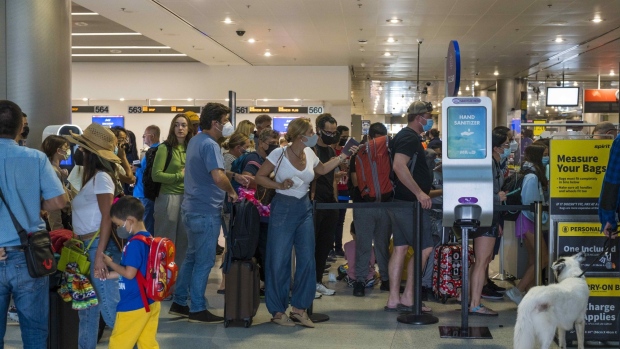May 4, 2022
Florida Flights Face Worst Delays in Years Thanks to Private Jets and Space Launches
, Bloomberg News

(Bloomberg) -- For much of the pandemic, many U.S. travelers experienced delay-free flights as air traffic plummeted. With leisure travel roaring back, the skies are jamming up, nowhere more so than in Florida.
Thanks to private jet flights, space launches and severe weather, the Sunshine State is seeing its worst gridlock in years. Airline officials and federal regulators are meeting this week in an undisclosed location to address the problem.
The increased delays are testing an aviation system that has faced Covid-19-related upheavals for both airline employees and federal air-traffic controllers for more than two years. Carriers including JetBlue Airways Corp., Spirit Airlines Inc. and Frontier Airlines, hungry to grow after years of red ink, are having to reduce Florida flights this summer despite growing demand.
The air-traffic system is essentially out of practice responding to peaks in demand, said John Hansman, an aerospace professor at the Massachusetts Institute of Technology, who has researched delays and the air-traffic system.
“I wouldn’t be surprised if, as traffic levels come up and also as we move into the convective season in other parts of the country, that you might see a similar increase in delays” in other regions, Hansman said.
Read more: U.S. Airline Pilot Shortage Crimping Summer Route Ramp-Up Plans
The disruptions in Florida have left thousands of passengers scrambling for alternate flights or paying for extra hotel stays and meals. JetBlue canceled flights at the both the start and conclusion of a trip to Florida for Beth Powell of West Virginia, who was traveling from Washington, D.C., to Fort Meyers, with her husband and two children, she said in an interview.
“We got it on both ends,” Powell said.
Data from the Federal Aviation Administration’s Jacksonville Center, which oversees flights that cross over the northern half of Florida, show that the area has seen more traffic growth this year than any such facility in the country.
Total flights handled by all of the FAA’s 22 air-traffic centers in the U.S. were down 7% in the first three months this year compared to the same period in 2019. By contrast, Jacksonville Center recorded a 5% increase.
The facility reported 8,935 delays that lasted more than 543,000 minutes -- the cumulative equivalent of more than a year -- in March alone. That’s the third-highest number of delays at any FAA Center since 2017 and the most since the start of the pandemic, according to FAA data. Delays have been elevated in the region since October.
Charter operations and private flights are driving the bulk of the flight increase. At Palm Beach International Airport, private and charter flights in March jumped 65% to 12,239, compared to 7,412 in 2019.
Private jet traffic picked up during the pandemic as consumers avoided packed commercial jets, said Peter Maestrales, chief executive officer of charter broker Airstream Jets.
“Palm Beach was typically a pretty quiet airport,” Maestrales said. “Now it’s unbelievable the departure delays, and just the amount of aircraft parked on the tarmac out there.”
Controllers have also had to contend with thunderstorms, nearby military flights and rocket launches. The FAA must close hundreds of miles during a launch from Cape Canaveral, where Elon Musk’s SpaceX has launched ten of its Falcon 9 missiles. There have been 17 launches in total from the complex this year so far, on pace for the most in decades.
“The combination of these factors leaves little margin for the system to absorb flight delays,” the FAA said in an emailed statement.
Carriers stung by the delays say they welcome the meeting with FAA officials this week to discuss possible solutions. There’s little airlines and the FAA can do to improve capacity instantly. Training new controllers and pilots takes months or longer. But carriers can adjust schedules to reduce peak periods or agree to take less efficient routes in less crowded airways.
“It’s simply that their traffic control is an unsustainable thing,” Frontier Chief Executive Officer Barry Biffle said on an April 28 conference call. “We’re really excited that the FAA is stepping in knee deep on this.”
©2022 Bloomberg L.P.


